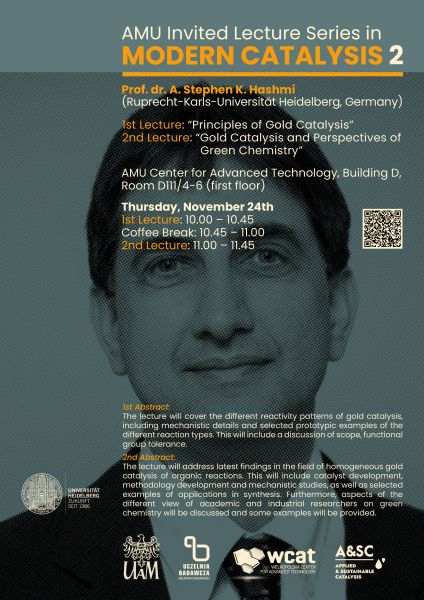Szanowni Państwo,
serdecznie zapraszamy na inauguracyjne wykłady w ramach nowego cyklu AMU Invited Lecture Series in MODERN CATALYSIS 2, które odbędą się w wersji tradycyjnej w czwartek, 24 listopada 2022 r w Centrum Zaawansowanych Technologii UAM, w sali D111/4-6 (pierwsze piętro).
Dwa wykłady wygłosi światowej sławy chemik katalityk prof. dr. A. Stephen K. Hashmi z Ruprecht-Karls-Universität Heidelberg (https://www.uni-heidelberg.de/institute/fak12/OC/hashmi/05/english/05home.htm)
Plan wykładów w CZT UAM (sala D111/4-6, pierwsze piętro):
10.00 – 10.45 Principles of Gold Catalysis
10.45 – 11.00 Przerwa kawowa
11.00 – 11.45 Gold Catalysis and Perspectives of Green Chemistry
Wykład organizowany jest przez Laboratorium Stosowanej i Zrównoważonej Katalizy Centrum Zaawansowanych Technologii UAM.
Serdecznie zapraszamy do udziału wszystkich naukowców, doktorantów i studentów, którym temat katalizy, chemii organicznej i metaloorganicznej jest bliski.
Poniżej przesyłam, krótkie CV profesora Hashmi, którego dorobek naukowy opiewa na prawie 500 publikacji. Liczba cytowań to ponad 36 000, a H-indeks: 92.
Załączam również streszczenie wykładu i plakat.
Prof. Hashmi jest wykładowcą, na którego prelekcje przychodzą zawsze tłumy, od lat wygrywa konkursy na najlepszego wykładowcę wśród studentów i doktorantów. Myślę, że jest to dodatkowa zachęta by posłuchać naszego gościa.
Prof. Dr. A. Stephen K. Hashmi studied Chemistry at Ludwig-Maximilians-University Munich, Germany (diploma thesis 1988) and got his PhD in 1991 with Prof. G. Szeimies, both on highly strained organic compounds. In 1991-1993, he joined the group of Prof. B. M. Trost at Stanford University, California, USA, as a postdoctoral fellow and worked on enyne metathesis and related reactions. Prof. Dr. Hashmi got his habilitation in the group of Prof. Dr. J. Mulzer, in 1993-1998 at the Institute of Organic Chemistry of Free University Berlin, Germany, Institute of Organic Chemistry of Johann Wolfgang Goethe-University Frankfurt, and in the Institute of Organic Chemistry of University of Vienna, Austria. He was visiting scientist at the University of Tasmania, Hobart, Australia, in 1999, temporary professorship for organic chemistry at the Department of Chemistry of Philipps-University Marburg, in 1999/2000. From 2001-2007, he became professor for organic chemistry at the Institute of Organic Chemistry of Stuttgart University. Since 2004, he is chair for Organic Chemistry at the Institute of Organic Chemistry of the Ruprecht-Karls-University Heidelberg. He was a director of the same institute (2008-2010, 2019-2021), dean of the Department of Chemistry and Earth Sciences of the Ruprecht-Karls-University Heidelberg (2010-2012), Vice Dean of the Faculty of Chemistry and Earth Sciences (2012-2013). Since 2013, he was Vice-Rector of Ruprecht-Karls-University Heidelberg (two continuous terms, 2013-2019). Since 2004 he is a Member of the South German Catalysis Institute, part of the Catalysis Research Laboratory (CaRLa, co-operation BASF/ Heidelberg University) (since 2007) and director on the side of Heidelberg University (since 2016). He received many awards and distinctions, such as the Hector Research Prize 2010 and ORCHEM Prize for Natural Scientists (2002). He is a founding member of Hector Fellow Academy (since 2013) and in 2021 he was elected as a member of the Academia Europaea. He is an author of 488 publications with the citation number 36125, h-index: 92. He is a member of the Editorial Board of Chem. Eur. J. (Wiley-VCH, up to 2022), Adv. Synth. Catal. (Wiley-VCH), Acc. Chem. Res. (ACS), board chair of the ChemCatChem (Wiley-VCH), editor-in-chief of the Journal Green Synthesis & Catalysis. His research is focused on transition metal catalysis, especially gold-catalyzed C-C- and C-heteroatom bond formation, but also Pd, Pt, Cu, Ag, Rh, Ir, Ru-catalyzed reactions (methodologies, mechanisms and enantioselective catalysis), bioorganometallic chemistry (interactions of helical-chiral organometallic compounds with DNA, organometallic compounds as prodrugs and conjugates of organometallic compounds and natural products, organometallic chemistry (enantiopure metallacycloalkanes, chiral coordinations polymers, cyclometallations and olefin insertions).


